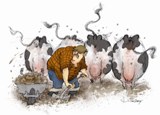Real ‘stinkers’ – the farm jobs we love to hate

There are loads of enjoyable tasks in farming – but, let’s be honest, there are a few stinkers, writes Andrew Blake.
In my mid-teens during school holidays I worked in a builders’ merchant’s yard where lorry loading and unloading was done by hand.
One of the nastiest jobs involved carrying hundredweight paper sacks of cement, delivered still almost too hot to touch, on my back and into store. I thought this was bad – but then I went into farming.
Leaving aside the mental angst of the-then relatively straightforward paperwork of my farm management days, it is the practical tasks that bring back the most unwelcome memories.
One of the first came during my pre-college practical year. Assigned to the grain store, I was given the job of bagging dried grain into 1.5cwt sacks, hauling them onto an electric sack lift, and back-packing them onto a stack two- and three-high.
Constant itching
The weight was just about tolerable, but the constant itching from barley awns poking through the hessian barely less so.
And it didn’t help knowing that the whole exercise would have to be repeated when we transferred the sacks by trailer to their final resting places, which included hard-to-reach obsolete calf pens and other small buildings.
Similar sheds were often used in summer to store small bales of hay and straw. The challenge of cramming the last ones into the eaves when the fresh air supply had been almost blocked off and the heat from the roof had become intense certainly made me question the wisdom of my decision to go farming.
Outside, things were often little better. One summer’s day, the temperature soared while I was hand-stacking hay bales into eights in a field far away from the farm buildings.
I’d emptied my water bottle within the first hour of an all-afternoon stint and there were no other supplies. I soon reached the point when I could think of nothing bar ice-cold drinks, and would readily have given my week’s wages (about £4, remember this was in the 1960s) for a can of Coke.
Cutting kale
At the other extreme of the temperature spectrum, I have equally disagreeable memories. Before college I used to relief milk twice a week.
But having softened my dry-skinned hands on the cows’ udders, I then had to cut kale for them – a job that despite gloves and lashings of creamy unguents left my fingers with a mass of cracks.
The farmer’s intention had been to forage-harvest the crop – but unfortunately it grew too lush and lodged. So it was a young colleague and I who got the task of cutting it by hand, laying it in rows and then loading it, again by hand, onto a trailer.
So what was so bad about that? Most of the crop was buried under at least a foot of snow so we had to find it first – it was during the 1963/64 winter.
After graduating, struggling to wrestle grubbed hop plants from frozen land was the cause of yet more chapped hands. So, too, was trying to unthaw iced-up water supplies to our sheep.
The relentless physical effort needed to keep an old-fashioned potato riddle supplied using a hand-fork, and to ensure the hop-picking machine conveyor remained full, will always stick in my mind.
And it is hard to forget the many ‘happy’ days spent mucking out calf pens, clearing grain elevator pits, sweeping silo walls, and emptying the slurry lagoon – all of which in those days required at least an element of “hands-on” work with materials most people would run a mile to avoid.
Hen droppings
Another non-favourite was winding out the weekly accumulations of droppings from the battery hen houses. Nine times out of 10 the backing paper would tear prematurely leading to some inevitable muck-dosing.
But the job I’d least like to return to involved hops yet again.
The picking machine stood over a pit, much like those found in garages but only about three feet deep. During the harvest, this filled up with all sorts of things apart from bits of hop plants.
By the time picking was over it contained a seething mass of rotting vegetation and insects, mainly aphids and ladybird larvae, but also flies and bluebottles attracted by the heat and smell.
Clearing it all out was a foul, slow job that involved filling buckets by hand and passing them up to colleagues through the few odd gaps between the machinery above.
It was impossible to stand upright, and kneeling risked getting covered in the ooze seeping from the stinking mass. Lovely!
* What are the jobs you most love to hate? Have your say on the forums.
